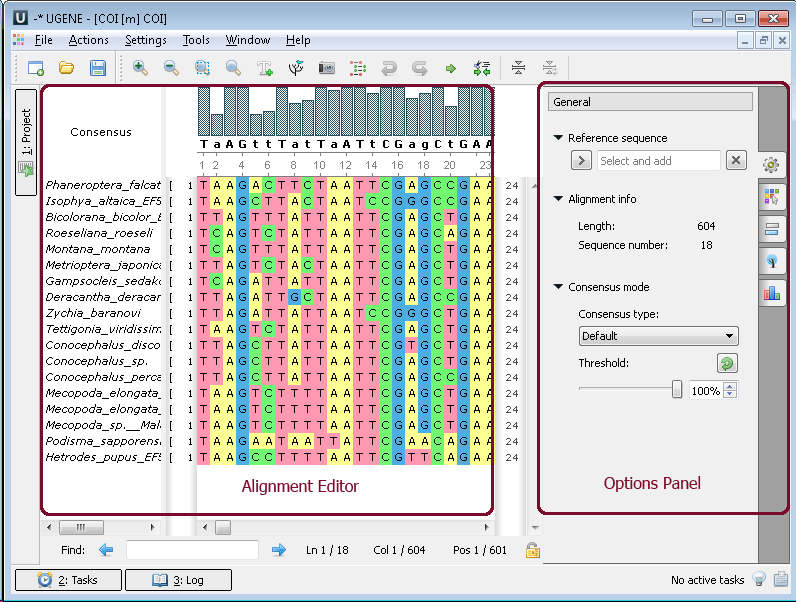
Viewer For Clustal .aln Files For Mac
Many people share .aln files without attaching instructions on how to use it. Yet it isn’t evident for everyone which program a .aln file can be edited, converted or printed with. On this page, we try to provide assistance for handling .aln files.
Clustal 2 comes in two flavors: the command-line version Clustal W and the graphical version Clustal X. Precompiled executables for Linux, Mac OS X and Windows (incl. XP and Vista) of the most recent version (currently 2.1) along with the source code are available for download here. On this page, you can find the list of file extensions associated with the ClustalW2 application. There are currently 2 filename extension(s) associated with the ClustalW2 application in our database. ClustalW2 is capable of opening the file types listed below. Conversion between the file types listed below is also possible with the help of.
1 filename extension(s) found in our database.
.aln - ClustalW2 Alignment Data
The ALN data files are related to ClustalW2. ALN file is a ClustalW2 Alignment Data. Clustal is a widely used multiple sequence alignment computer program.
- Application:
- ClustalW2
- Category:
- Data files
- Mime-type:
- application/octet-stream
- Magic:
- - / -
- Aliases:
- -
- ClustalW2 Alignment Data related extensions:
- .dnd
- ClustalW2 Guide Tree Data
Naturally, other applications may also use the .aln file extension. Even harmful programs can create .aln files. Be especially cautious with .aln files coming from an unknown source!
Can't open a .aln file?
When you double-click a file to open it, Windows examines the filename extension. If Windows recognizes the filename extension, it opens the file in the program that is associated with that filename extension. When Windows does not recognize a filename extension, you receive the following message:
Windows can't open this file:
example.aln
To open this file, Windows needs to know what program you want to use to open it. Windows can go online to look it up automatically, or you can manually select one from a list of programs that are installed on your computer.
To avoid this error, you need to set the file association correctly.
- Open Control Panel > Control Panel Home > Default Programs > Set Associations.
- Select a file type in the list and click Change Program.
The .aln file extension is often given incorrectly!
According to the searches on our site, these misspellings were the most common in the past year:
alb, anl, amn, alg, wln, zln, ln, apn, lan, aon, an, alm
Is it possible that the filename extension is misspelled?
Similar file extensions in our database:
- .alb
- JASC Image Commander Album
- .wln
- Novell Localisation Workbench Workspace
- .alg
- Bentley InRoads Survey Alignment File
- .alb
- Alpha Five Library
- .anl
- Alphacam Nest List
- .alb
- Alphacam Laser VB Macro
Operating systems
DataTypes.net currently supports the following operating systems:
Windows XP/Vista, Windows 7/8, Windows 10, CentOS, Debian GNU/Linux, Ubuntu Linux, FreeBSD, Mac OS X, iOS, Android
If you find the information on this page useful, please feel free to link to this page.
If you have useful information about the .aln file format, then write to us! Excel miner for mac.
Please help us by rating this page below.
0down votefavoriteI want to run clustalw non-interactively, i.e., with options
I have a fasta file with 10 sequences, named ten.fa, for which I generated alignment and phylogenetic tree, with command like:
name=tenclustalw2 -INFILE=$name.fa -ALIGN -OUTFILE=$name.alnclustalw2 -INFILE=$name.aln -TREE -OUTFILE=$name.phso far I have following files
ten.faten.alnten.ph
I have a new fasta file with 1 sequence, named
one.fa
for which I want to generate new aln and phylogenetic tree, named like
eleven.alneleven.ph
How should I construct the command line? TIA
Maybe this will help (not meant to be rude I just don't have experience with this):
6) SUMMARY OF THE COMMAND LINE USAGE
Clustal W is designed to be run interactively. However, there are many situations where it is convenient to run it from the command line, especially if you wish to run it from another piece of software (e.g. SeqApp or GDE). All parameters can be set from the command line by giving options after the clustalw command. On UNIX options should be preceded by '-', all other systems use the '/' character. Godex g300 driver download.
If anything is put on the command line, the program will (attempt to) carry out whatever is requested and will exit. If you wish to use the command line to set some parameters and then go into interactive mode, use the command line switch: interactive .. e.g.
clustalw -quicktree -interactive on UNIX or
clustalw /quicktree /interactive on VMS,MAC and PC
will set the default initial alignment mode to fast/approximate and will then go to the main menu.
To see a list of all the command line parameters, type:
clustalw -options on UNIX or
clustalw /options on VMS,MAC and PC
and you will see a list with no explanation.
To get (VERY BRIEF) help on command line usage, use the /HELP or /CHECK (-help or -check on UNIX systems) options. Otherwise, the command line usage is self explanatory or is explained in clustalv.doc. The defaults for all parameters are set in the file param.h which can be changed easily (remember to recompile the program afterwards :-).